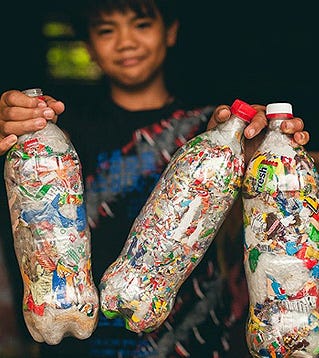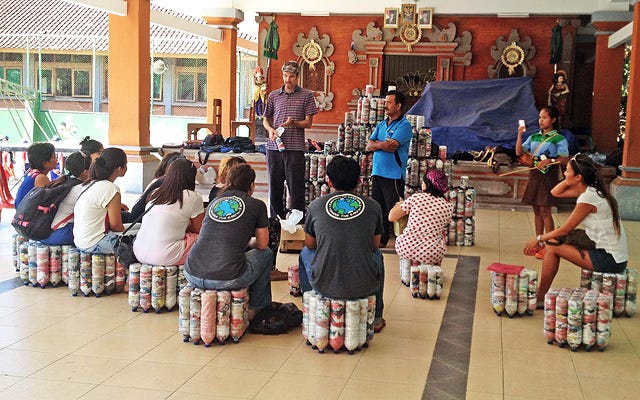Guest post by Ally Pecego
While living in the Philippines by the Chico River Valley, Russell Maier, the creator of what would come to be known as ecobricks, noticed plastic piling up along the waterfronts, polluting the otherwise serene waters and beaches. Disturbed by the change of the once untouched landscape to the hazardous site it had become, Maier set out to do something to constructively remove the buildup.
Rather than just collecting the plastic and non-biodegradable trash only to throw it away, Maier put the pieces into a bottle and filled to the brim until it was as hardy and strong as a brick--or at least comparable to the strength of a brick. From this, the concept of ecobricks was born.
Composed of two liter plastic bottles and stuffed with non-biodegradable plastics, ecobricks are a vessel that contains items such as styrofoam, bags, packaging, and straws that would otherwise end up in landfills, beaches and parks, or would be burned.
Ecobricks are making the world a healthier place!
Ecobricks are also tools to build small structures like gardens, walls, and even homes. This repurposed plastic is inexpensive and virtually lasts forever, so they are effective materials for construction projects across the world--and they are being used in countries all over.
Right now, Indonesia, Vietnam, India and the Philippines are some of the top nations utilizing this new technique. Making ecobricks is also a part of the school curriculum in towns all over the Philippines since they provide an opportunity to teach children about the plastic problem, ways to address it, and results in the formation of new community gardens or furniture for classrooms, heightening the importance of community.
While plastics continue to be manufactured and used for almost everything we buy, contributing to the ever increasing presence of plastic everywhere, ecobricks provide a temporary solution to this ongoing problem. Pressure is often put on the consumer to change their habits, but the issue lies deeper than individual actions--plus, there is no easy way to avoid all plastic use without incredible due diligence and determination.
So, while we ecobrick our way to a safer and healthier environment, we can also focus on rooting out the issue by getting plastic bans implemented in every town, city, and state--maybe even the world one day. The power of policy is undermined, and if enough people feel passionately, change can and will follow.
So, this week’s actions are:
Make an ecobrick yourself and put your plastic waste to use!
After making it you can either build something yourself or donate it to an ecobrick exchange hub (use this step-by-step guide on how to make an ecobrick and this website to get more information on where you can go to donate your ecobrick). You can also get more information atecobricks.org and find other fun and creative ways to put ecobricks to use.
For a longer-term solution, lobby your representatives and ask for a plastic ban with the goal to eventually phase out all single use plastics, such as the Break Free From Plastic Pollution Act, which aims to make plastic producers fiscally responsible for the waste they create and sell, while also putting a ban on all single-use plastics. Use this representative finder website to get more information about your representative and this template sample to see a simple letter format you can use to lobby your representative. (And for more information on the current plastic ban act, check out the Plastic Pollution Coalition to learn about the goals and steps of this act.)
Ally Pecego is from Long Beach, California but is now at UC Santa Cruz pursuing a double major in Environmental Studies and Legal Studies as a third-year undergraduate. She has experience in sustainable research as a UCSC Dining Sustainable Coordinator, as an intern at Committee to Bridge the Gap, a non-profit organization that focuses on nuclear policy issues, and at Sustainable Systems Research Foundation, where she explored compostable container alternatives for local restaurants and grocery stores. Her hope is to one day be involved with environmental policy at the national or international level to mitigate climate change and attain a sustainable future for all. You can contact her at allypecego@ymail.com for any questions!
A note from Michele:
Hi friends! I’ve been researching some inspirational stories in the past couple weeks that I’m excited to share with you in the coming weeks. In the meantime, here’s a recent piece I wrote for Elemental.
On another note, I’d love to get your feedback about the kind of stories and content you’re interested in me adding to this newsletter. Do you want more how-to stories to get you taking action? Stories of how people are making change? More about my family getting out and taking steps to change? Or about our community here doing meaningful work? Drop me an email (michele@michelebigley.com) with your ideas, or just to say hi!






